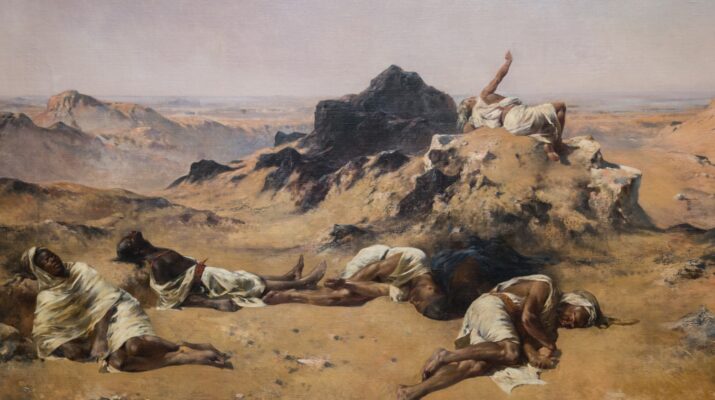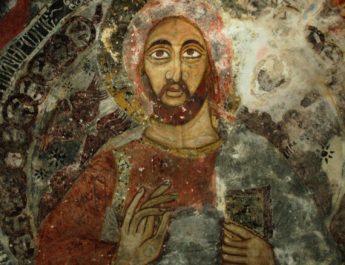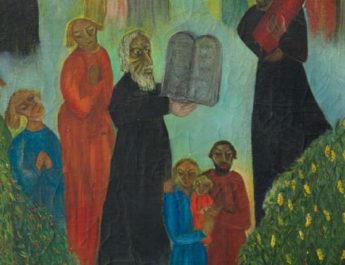Psalm 22:1-2, 14-21
NL 238
To the leader:I according to The DeerII of the Dawn.III A PsalmIV of David.V
I “leader” = natsach. Properly, something that glitters from a distance. So, something that stands out, excels, has status/standing (such as a chief musician or superintendent of Temple services). This can also mean to be permanent or enduring.
II “Deer” = ayeleth. 3x in OT. From ayyal (stag, deer); from the same as ulam (a porch); from the same as ul (mighty, body, belly); from an unused root meaning to twist, be strong. This is doe or tree. It can also be a compliment for one’s wife.
III “Dawn” = shachar. Root may mean to look for in early hour or in a diligent way. This is dawn, early light, or morning.
IV “Psalm” = mizmor. From zamar (making music; used specially of music to worship God; music with singing, singing praise, singing psalms); may be from zamar (to trim or prune). This is a melody or a psalm.
V “David” = David. From the same as dod (beloved, love, uncle); the root may mean to boil, which is used figuratively to describe love. So, this implies someone you love such as a friend, a lover, or a close family member like an uncle. David’s name likely means something like “beloved one.”
1 My God,VI my God, why have you forsakenVII me?
Why are you so farVIII from helpingIX me, from the wordsX of my groaning?XI
VI “God” = El. This is God or a god.
VII “forsaken” = azab. To loosen, relinquish, permit, forsake, fail, leave destitute.
VIII “so far” = rachoq. From rachaq (to widen, become distant, cast, or remove in a literal or figurative sense). This is distant or far, whether of space or of time.
IX “helping” = yeshuah. From yasha (to deliver, defend, help, preserve, rescue, be safe. Properly, to be open, wide or free, which implies being safe. Used causatively, it means to free). This is salvation, deliverance, health, victory, prosperity.
X “words” = dabar. From dabar (to speak, declare, discuss). This is speech, a word, a matter, an affair, charge, command, message, promise, purpose, report, request. It is a word, which implies things that are spoken of in a wide sense.
XI “groaning” = sheagah. 7x in OT. From shaaq (to roar, moan, groan). This is roaring or moaning. It is used of human groaning and lions roaring.
2 O my God,XII I cryXIII by day,XIV but you do not answer;XV
and by nightXVI but find no rest.XVII
XII “God” = Elohim. Related to “God” in v1 See note VI above.
XIII “cry” = qara. This is to call or call out – to call someone by name. Also used more broadly for calling forth.
XIV “by day” = yomam. From yom (day, age, daily, each, today). Root may mean to be hot. So, this is day as the hours that are hot. This can be daytime in a literal or figurative sense.
XV “answer” = anah. This is answer, respond, announce, sing, shout, or testify. It means to pay attention, which implies responding and, by extension, starting to talk. Used in a specific sense for singing, shouting, testifying, etc.
XVI “night” = layil. Properly, this refers to light twisting away. It is used for night or midnight. Figuratively, this can mean adversity.
XVII “rest” = dumiyyah. 4x in OT. From the same as dumah (silence). This is silence or stillness. Figuratively, it could be trust or death.
14 I am poured outXVIII like water,XIX
and allXX my bonesXXI areXXII out of joint;XXIII
XVIII “poured out” = shaphak. This is to pour out, gust, or slip. It can be to pour as blood, a drink offering, or molten metal. It can also mean to create a mound. Figuratively, it can refer to killing, or spending money.
XIX “water” = mayim. This is water, waters, or waterway in a general sense. Figuratively, it can also mean juice, urine, or semen.
XX “all” = kol. From kalal (to complete). This is all or every.
XXI “bones” = etsem. From atsam (vast, numerous, strong; to close one’s eyes, to make powerful; to break bones). This is self, life, strength, bone, or substance.
XXII “are” = hayah. This is to be or become, to happen.
XXIII “out of joint” = parad. This is to divide, break through, scatter, sever, stretch, to spread oneself, or to be out of joint.
my heartXXIV is like wax;XXV
it is meltedXXVI withinXXVII my breast;XXVIII
XXIV “heart” = leb. From the same as lebab (the heart, courage, one’s inner self, the mind, the will; only used in a figurative sense in the Bible); may be related to labab (to encourage; properly, to be encased as with fat; used in a good sense, this means to transport someone with love; used in a bad sense, it can mean to dull one’s senses).. This is inner self, mind, will, feelings, the center.
XXV “wax” = donag. 4x in OT– 3x in Psalms, 1x in Micah. This is wax – always used of wax meting.
XXVI “melted” = masas. This is to melt, discourage, faint. It can be to deteriorate from a sickness or weaken because of sleepiness or an emotional response.
XXVII “within” = tavek. This is among, middle, in the midst, the center. Perhaps, properly, to sever.
XXVIII “breast” = meeh. This is inward parts, belly, heart, womb, intestines, vastness. It can also be figurative for sympathy.
15 my mouthXXIX is dried upXXX like a potsherd,XXXI
XXIX “mouth” = koach. Root may mean to be firm. This is power, strength, force. It can be literal or figurative, positive or negative. It can also mean capacity or means – what something produces. Additionally, it could refer to some kind of small reptile.
XXX “dried up” = yabesh. This is to be dry, withered, confused, or ashamed. It can also be to fail.
XXXI “potsherd” = cheres. 17x in OT. This is earthenware, a potsherd, a stone.
and my tongueXXXII sticksXXXIII to my jaws;XXXIV
XXXII “tongue” = lashon. This is tongue, talker, language, or wedge. It can also be a tongue of flame or a water cove.
XXXIII “sticks” = dabaq. This is to follow closely or abide fast, to cling or be joined together. Figuratively, it can mean to catch something by chasing after it, to overtake, or to stick. A man clings to his wife in Genesis 2:24, Shechem was deeply attracted to Dinah in Genesis 34:3, Ruth clung to Naomi in Ruth 1:14, Solomon clung to his foreign wives and concubines in 1 Kings 11:2. It is also used of a tongue sticking to the mouth, pursuing or overtaking as in battle, and also clinging to God.
XXXIV “jaws” = malquowach. 8x in OT. – 5x of booty, 1x for jaws, 1x for prey. From laqach (to take, accept, carry away, receive). This is jaws as that which takes in food. Used intransitively, it is spoil and captives as things that are taken.
you layXXXV me in the dustXXXVI of death.XXXVII
XXXV “lay” = shaphath. 5x in OT. This is to lay, ordain, locate, establish, light on fire, bring.
XXXVI “dust” = aphar. May be related to aphar (to throw dust, be dust). This is dust as powdered, perhaps gray colored. It could be ashes, powder, ground, dry earth, clay mud, or rubbish.
XXXVII “death” = mavet. From muth (to die in a literal or figurative sense). This can be death, deadliness, the dead, or the place where the dead go. It can be used figuratively for pestilence or ruin.
16 For dogsXXXVIII are all aroundXXXIX me;
a companyXL of evildoersXLI encirclesXLII me;
XXXVIII “dogs” = keleb. This is yelping or attacking. It can also refer to a dog or it can be a term used for a male prostitute.
XXXIX “all around” = sabab. This is turning around, going around; to surround, cast, walk, fetch. It is to revolve or border in a literal or figurative sense.
XL “company” = edah. From yaad (to appoint, assemble or gather selves, agree) OR from ed (witness, testimony, recorder); from ud (to admonish, repeat, duplicate, testify, restore, record, relieve). This is a congregation, assembly, or company. It could be a family, crowd, or fixture.
XLI “evildoers” = ra’a’. This is to be evil, bad, afflict. Properly, it means to spoil – to destroy by breaking into pieces. Figuratively, it is to cause something to be worthless. It is bad in a physical, social, or moral sense – something that displeases, does harm or mischief, punishes or vexes.
XLII “encircles” = naqaph. 19x in OT. This is to strike, cut down, surround, destroy, corrode, knock together, or enclose. It can be to surround as a guard or like the sea. It can meaning coming to the end of a festival time or enclosing in a net or trap.
they boundXLIII my handsXLIV and feet.XLV
17 I can countXLVI all my bones.
XLIII “bound” = karah. 17x in OT– 8x of digging a pit or trap, 2x of digging a well, 2x of digging a tomb, 2x of bargaining, 1x shriveled, 1x opening an ear, and 1x of digging up evil. This is properly to dig or open up. Figuratively, it can be to plot or make a banquet.
XLIV “hands” = yad. This is hand, ability, power. Hand in a literal sense, but also what one can do or the means by which one does it.
XLV “feet” = regel. This is foot, endurance, or journey. It is a foot as the means of walking and so it implies a step or a greater journey. It can be used euphemistically for private parts.
XLVI “count” = saphar. From sepher (writing, document, book, evidence). This is properly to tally or record something. It can be enumerate, recount, number, celebrate, or declare.
They stareXLVII and gloatXLVIII over me;
18 they divideXLIX my clothesL among themselves,
XLVII “stare” = nabat. This is to behold, look at intently, consider, or scan. It can mean to have respect or regard someone favorably.
XLVIII “gloat” = raah. This is to see in a literal or figurative sense so stare, advise, think, view.
XLIX “divide” = chalaq. This is to be smooth in a figurative sense. So, it can refer to the stones that were part of casting lots – hence, apportion, share, distribute. Figuratively, it can also mean to flatter.
L “clothes” = beged. From bagad (to cover or conceal; figuratively, to act in a covert or treacherous way, to transgress or pillage). This is clothing, garment, robe, or some other kind of clothing. Figuratively, it can be treachery or pillaging.
and for my clothingLI they castLII lots.LIII
LI “clothing” = lebush. From labash (to wrap around, which implies clothing oneself or someone else; wrapping around in a literal or figurative way). This is clothing literally or figuratively. It can be used as a euphemism for a wife.
LII “cast” = naphal. This is to fall, whether by accident, to fall prostrate, or to fall in violent death. Figuratively, it can refer to personal ruin or calamity, a city falling, an attack or a falling away. It can also be a deep sleep or wasting away.
LIII “lots” = goral. Root may mean to be rough like a stone. A lot was probably a small pebble used to determine one’s portion or what one should do (the will of a god or one’s destiny).
19 But you, O Lord,LIV do not be far away!LV
O my help,LVI come quicklyLVII to my aid!LVIII
LIV “Lord” = YHVH. Related to “are” in v14. From havah (to be, become) or hayah (see note XXII above). This is the name of the God of Israel, the self-existent and eternal one, the tetragrammaton. This pronunciation has been lost to time so “Lord” is generally used in its place.
LV “far away” = rachaq. Related to “so far” in v1. See note VIII above.
LVI “help” = eyaluth. Related to “deer” in v1. 1x in OT. Akin to ayil (ram, tree, strength, post); akin to ul (see note II above). This is my help, power – implies protection and strength.
LVII “come quickly” = chush. This is to hurry, be eager.
LVIII “aid” = ezrah. From ezer (help, aid, helper); from azar (to help, protect, support, ally; properly, to surround so as to provide aid). This is help, helper, support.
20 DeliverLIX my soulLX from the sword,LXI
my lifeLXII from the powerLXIII of the dog!
LIX “deliver” = natsal. This is to snatch someone or something away in a good sense – as rescue, defend, or deliver – or in a bad sense – as strip or plunder.
LX “soul” = nephesh. Related to naphash (to refresh or be refreshed). This is soul, self, person, emotion. It is a breathing creature. Can also refer to appetites and desires.
LXI “sword” = chereb. From charab (to attack, slay). This is any sharp instrument like a sword, dagger, axe, or mattock.
LXII “life” = yachid. 12x in OT. From yachad (to join, be united). This is united, sole, solitary, only, or desolate. It can also mean beloved or darling.
LXIII “power” = yad. Same as “hands” in v16. See note XLIV above.
21 SaveLXIV me from the mouthLXV of the lion!LXVI
From the hornsLXVII of the wild oxenLXVIII you have rescuedLXIX me.
LXIV “save” = yasha. Related to “helping” in v1. See note IX above.
LXV “mouth” = peh. This is mouth in a literal or figurative sense. So, more literally, it can be beak or jaws. More figuratively, it refers to speech, commands, or promises.
LXVI “lion” = ari. From arah (to gather or pluck). This is a young lion.
LXVII “horns” = qeren. This is horn or hill. It can be a flask or cornet, ivory, altar corner, mountain peak, or figuratively power.
LXVIII “wild oxen” = reem. 9x in OT. From raam (to lift up). This is a wild bull or ox.
LXIX “rescued” = anah. Same as “answer” in v2. See note XV above.
Image credit: “Country of Thirst” by Eugène Fromentin.




